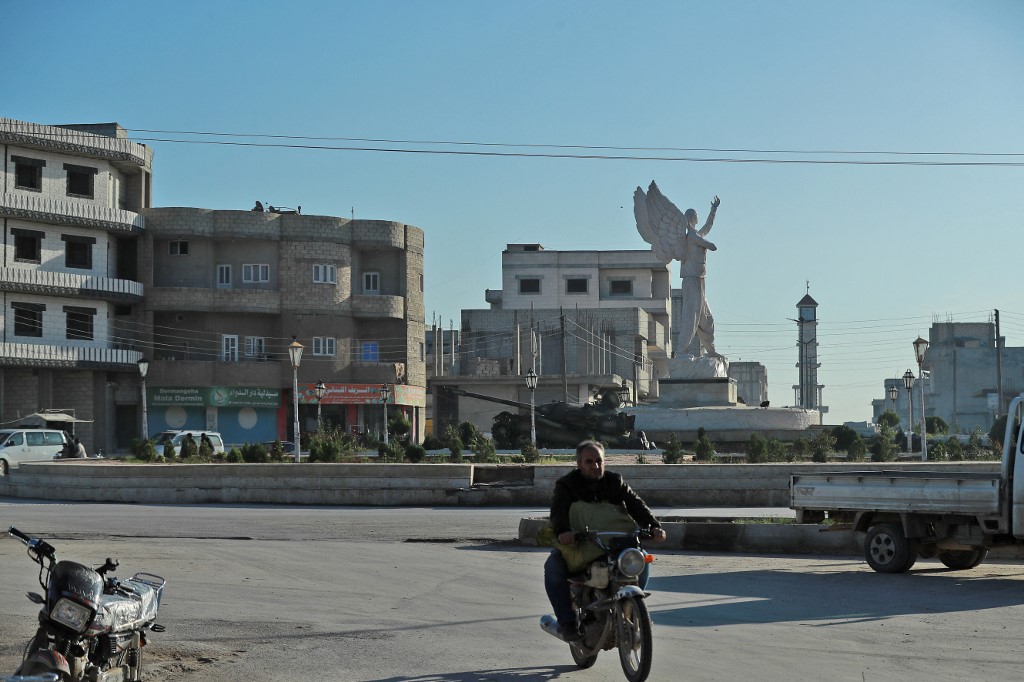Kurds in northern Syria who woke to deadly Turkish air strikes overnight expressed fear and anger on Sunday, accusing the United States of abandoning them after they spearheaded the fight against the Islamic State of Iraq and the Levant (ISIL) group.
In the small city of Al-Malikiyah, in Syria’s far northeastern corner, shops were closed and streets were deserted.
“We are scared because we’ve already been through this,” said Mohammed Rajab, who already fled the northern city of Afrin during a Turkish offensive four years ago.
“We face the same fear again when we hear the sound of planes and air strikes,” the 65-year-old said.
“Where can we go? There is nowhere else to go,” he added. “We put ourselves in God’s hands.”
After a night of strikes in northern and northeastern Syria — mainly targeting the city of Kobani and its surroundings — Ankara said Sunday it had carried out raids against the bases of outlawed Kurdish militants across northern Syria and Iraq.
The deadly offensive comes a week after a blast in central İstanbul that killed six people and wounded 81, and which Turkey blames on the outlawed Kurdistan Workers’ Party (PKK), which has waged a bloody insurgency there for decades.
‘We are afraid’
The Syrian Democratic Forces, the de facto army of the semi-autonomous Kurdish administration in northeastern Syria, provided crucial assistance to a US-led coalition against ISIL terrorists.
Turkey, whose soldiers are present across areas of northern Syria, considers the SDF’s main component — the Kurdish People’s Protection Units (YPG) — a terror group linked to the PKK.
Since May, Turkey has intensified threats to launch a broad operation against the SDF.
Both the PKK and the YPG have denied any involvement in the İstanbul attack.
“Every time threats are declared, we are afraid, we can’t sleep, activity in the city stops,” said Abir Mohammed, who runs a sweet shop in the city.
“We are thinking of leaving, but what do we do with our houses?” she added.
Between 2016 and 2019, Turkey launched three operations in Syria’s north, targeting Kurdish militias and organizations and taking control of the Afrin region.
The 2019 assault came after then-president Donald Trump controversially withdrew US forces from the parts of the country’s northeast.
‘Stained with blood’
On Sunday, dozens of people held a brief protest in Al-Malikiyah, denouncing the Turkish attacks but also Washington’s “abandonment”, an AFP correspondent said.
Some waved Kurdish flags or held pictures of PKK leader Abdullah Öcalan, who remains imprisoned in Turkey.
“Death to America,” one protester yelled — an unusual slogan in an area where US forces still lead an international coalition against ISIL.
“America is a partner of (Turkish President Recep Tayyip) Erdoğan, whose hands are stained with the blood of our martyrs,” the protester said, requesting anonymity.
“America could have prevented the death of our fighters, who paid with their blood to protect us,” she added.
In Kobani, residents said many shops and schools were closed Sunday.
The northern city became a symbol of Kurdish resistance after the YPG, with US support, pushed ISIL out in a battle that began in late 2014.
“The heroic city of Kobani stopped the global terror of ISIS and protected humanity, and now they should be supported by the international community,” YPG spokesman Nuri Mahmoud tweeted, referring to the extremist group.
Kobani resident Bozan Ahmed said “fear reigns among the civilians.”
“We don’t know if the bombing will continue or not,” he told AFP by telephone.
Some people had hidden in shelters or basements, while others fled to nearby villages, he said.
“We fear for our children and our families. We don’t know where to go,” Ahmed said.
© Agence France-Presse

